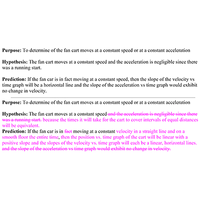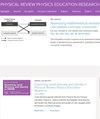在高中探究性科学学习环境课堂中通过修改实验报告提高科学能力
IF 2.6
2区 教育学
Q1 EDUCATION & EDUCATIONAL RESEARCH
Physical Review Physics Education Research
Pub Date : 2023-12-15
DOI:10.1103/physrevphyseducres.19.020166
引用次数: 0
摘要
[本文是 "教学实验重点文集 "的一部分:改进传统和新方向]。国家组织设定的目标是让学生参与实验和真实的科学推理,同时发展规范的概念,帮助他们发展必要的技能和能力,以便在快速变化的世界中取得成功。符合这些目标的一个框架是探究性科学学习环境(ISLE)物理教学法。虽然已经对基于 ISLE 的课堂中学生科学能力的发展进行了研究,但对形成性评价如何帮助促进学生在这种环境中的成长却知之甚少。本文介绍了一项实证研究的结果,即在 ISLE 课堂中,书面实验报告的修改如何对高中一年级学生科学能力的发展产生积极影响。我们认为,修改书面作业的机会为学生提供了支持其科学能力发展所必需的额外机会。此外,我们还探讨了学生参与合作写作过程与对实验物理的态度之间的正相关关系。本文章由计算机程序翻译,如有差异,请以英文原文为准。

Improving scientific abilities through lab report revision in a high school investigative science learning environment classroom
[This paper is part of the Focused Collection on Instructional labs: Improving traditions and new directions.] National organizations set goals of engaging students in experimentation and authentic scientific reasoning while developing normative concepts to help them develop essential skills and competencies necessary to succeed in our rapidly changing world. One framework that meets these goals is the investigative science learning environment (ISLE) approach to teaching and learning physics. While studies have been conducted on student development of scientific abilities in ISLE-based classrooms, little is known about how formative assessment helps promote student growth in this setting. This paper presents on the findings from an empirical study on how the revision of written laboratory reports positively impacts first-year high school student development of scientific abilities in an ISLE-approach classroom. We argue that the opportunity to revise written work provides students with additional exposures that are necessary to support their scientific ability development. Furthermore, we explore positive correlations between student involvement in the collaborative writing process and attitudes regarding experimental physics.
求助全文
通过发布文献求助,成功后即可免费获取论文全文。
去求助
来源期刊

Physical Review Physics Education Research
Social Sciences-Education
CiteScore
5.70
自引率
41.90%
发文量
84
审稿时长
32 weeks
期刊介绍:
PRPER covers all educational levels, from elementary through graduate education. All topics in experimental and theoretical physics education research are accepted, including, but not limited to:
Educational policy
Instructional strategies, and materials development
Research methodology
Epistemology, attitudes, and beliefs
Learning environment
Scientific reasoning and problem solving
Diversity and inclusion
Learning theory
Student participation
Faculty and teacher professional development
 求助内容:
求助内容: 应助结果提醒方式:
应助结果提醒方式:


